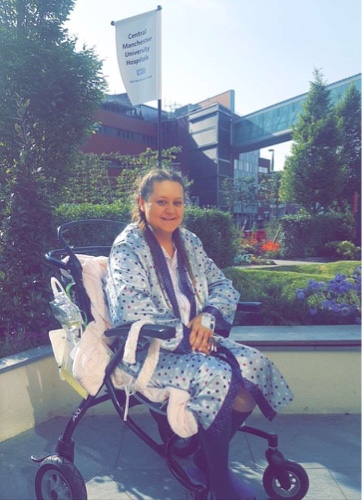How much do you know about your kidneys? These two fist-sized beans do more than you think. What happens though when your kidneys don’t work as should? Chronic Kidney Disease (CKD) affects over 3 million people in the UK, yet it is a disease that very few people know anything about.
Chronic Kidney Disease is a decline in function due to damage. There are many different types of disease that can cause the kidneys to fail but some very common causes are uncontrolled high blood pressure or diabetes, sustained dehydration and issues with the immune system.
CKD affects patients in different ways and the treatments can vary from maintenance of your general health to more serious treatments such as dialysis and transplantation. Here are the stories of those who have been affected by kidney disease.
Andrew France – Chronic Kidney Disease
I have Nephrotic Syndrome Steroid Resistant Minimal Change Disease (MCD)/ Focal Segmental Glomerulosclerosis (FSGS). This means I have scarring or damage to the glomerulus – the tiny filters in the kidneys.
I was diagnosed in August 2014 after I arrived for a holiday in China. My feet were badly swollen and they suspected I had a DVT. I was taken to hospital and after some tests I was diagnosed with Nephrotic Syndrome. I have not got to the point yet where I need dialysis or a transplant but I do suffer from fatigue and swelling to my lower legs. I used to be quite handy around the house and being to do my own gas, plumbing works and electrics but now I struggle and I have to pay somebody to do these jobs that I used to be able to do so easily. This plays on my mind a lot. Most of my days are spent with my legs. The worst comment that someone could say to be is “you look well”.

I am on a ‘no salt’ diet, which is interesting as pretty much everything contains salt and I try to limit my fluids but this is hards as I have now developed type 2 diabetes due to the steroid treatment for my kidneys, so I feel constantly thirsty.
I have a few complications due to my illness, but this is mainly due to the side effects from my medication. I have developed diabetes and had two cataracts removed due to Prednisolone, a steroid drug. I have had severe reactions to most immunosuppressants and Tacrolimus sent my kidney function spiralling down, thankfully this is back to my normal level.
My wife Qi is my biggest support mentally and when I can’t get about and need some help bathing. She is a very strong woman and has done an enormous amount of research with different kidney specialists on how best to treat me. She sorts my medication out into a dosette box and reminds me when to take them. Brain fog can make me forgetful.
Apart from the fatigue, aches, pains and daily struggle with mobility, the hardest part is that this is an invisible illness and that I look healthy and well. The positives to this illness are the people I have met on my journey. People with kidney problems are some of the nicest people I have ever met, whether on social media or at Kidney Care awareness days. I must not forget to mention the two wonderful Kidney Care advocates, Giulietta Whitmore and Francesca Teasdale.
No one knows what the future holds for me and I’ve given up reading about the disease on the internet as it will scare you.
Martyn Ball – Home Haemodialysis Patient
I have a condition called Nephritis, which I was diagnosed with at birth. There is a history of this disease within my family. My brother also has this illness and is currently on dialysis.
Right from the start of going into renal failure, I knew that I wanted to do my treatment at home so I chose to do Home Haemodialysis. My day-today is tough as I still work full time in a physical job and try to go to the gym four times a week and dialyse late at night. It’s not easy but I like to think myself as an example of what’s possible if you look after yourself and eat right to limit the negative effects of the illness.

Luckily I don’t have any dietary restrictions at the moment as I still pass fluid and my blood levels are still quite good. Dialysis leaves me feeling washed out and exhausted and it’s definitely hard to get up and go to work most days. The only complications I’ve had so far, has been a blood clot in my fistula that couldn’t be cleared, so, the clotted section was cut out and the fistula reformed. My partner is very supportive, but I live alone so manage home treatment by myself.
The hardest part of this condition has to be the fatigue. I never thought it was possible to feel sick from exhaustion, though I do push myself too far at times. The positives has to be the fact that I now see joy in the simple things in life and don’t stress over things that don’t matter. It has given me a different perspective on life. Moving forward, I’ve set myself the target of winning a medal in the transplant games when I get a new kidney so I have a focus to work towards.
Emma Boyle – Transplant patient
I found out I had kidney failure in 2014 when I was 21 years old. I only had 27% kidney function remaining. My kidney failure began through a simple UTI which had been left too long and developed into a kidney infection, which in turn harmed both my kidneys. I knew from that point I would need a kidney transplant.
I received my kidney transplant on the 21st May 2018 avoiding dialysis by a week.

My restrictions varied both before and after transplant, before transplant I was on a fluid restriction of 1 litre and a low phosphate and potassium diet. After transplant I am advised to drink at least 3 litres of fluid a day, and I still have to stick to my low potassium and low salt diet. Living with my condition is a struggle more often than not, before transplant it was hard to get of bed I was asleep more often than not. I struggled to eat due to nausea, I suffered with restless leg syndrome and it was completely taking over my life. Since my transplant my life has changed in many ways, I have so much more energy, I am able to meet with friends again, I have lost lots of weight due to not retaining fluid any more.
However, with my transplant I’ve had a number of complications, I’ve had to have a number of blood transfusions due to my blood levels dropping low and I have a condition called gastroparesis where my stomach struggles to empty and makes me sick more often than not.
My family and close friends are amazing in helping and monitoring my condition and during my transplant were my heroes. They took me back and forth hospital, helped to manage my tablets when I was too poorly to sort them out and they even offered to donate their kidney to me and went through testing.
The hardest part of my condition is the ups and downs of the condition. I never really know where I am with it, some days will be good, others bad. Overall the condition is hard to live with but a transplant really does change your life!
David Spencer – Kidney Donor to his wife
My wife and I have known each other since the age of 10. We went through school together; after leaving school we went our separate ways and did not see each other for around 20 years until we went to a school reunion and the rest is history as they say! We have now been married 17 years.
My wife’s kidney condition started around two years ago when she got a bad cold and felt tired. She went to the doctors, they did blood tests and in June 2017 she was told both kidneys were slowly fading.
On Wednesday 6th March 2019 we underwent the transplant and I donated a kidney to my wife. Coping day-to-day was easy as my wife and I are quite upbeat about everything. It is what it is, there is no point in moping around and being miserable as you will drag everybody around you down as well, so you just get on with it. My wife was not on dialysis at any point.
It was an easy decision to become a donor for my wife as, this may sound silly but she is my wife who I love. We had a chat with the children about this, and they told us straight away to do it and not to be selfish (in case one of the children needed one). They could could go through life and have no problem, whereas their mum needs one now.
The surgery went fine from both ends, my wife is still in and recovering and will hopefully be out at the weekend. Ii came home on Friday 8th, I’m recovering with stomach pains from surgery but this was to be expected as part of healing. There have been no complications so far regarding our recovery. We have good family and friends who are helping and are there when we need them
My wife hasn’t moaned about anything to do with her condition because she knew she was
Lucky that I was a match and can only get better. Having said that the only thing was she was starting to get tired earlier in the night but she did still work full time up until the day before she went in for the operation.
Positives to her condition at the moment are a bit scarce as she is still in hospital but she has said she feels more upbeat and kidney is working fine. Also she can now have tomato soup, which she has missed!
I only donated a week ago, and to be honest I don’t feel like I’ve had a kidney removed, but I know that my health will improve in the coming days. I am now eating healthier, drinking less coffee and more water and eating more fruit. I only have kidney now so I have to look after it!








